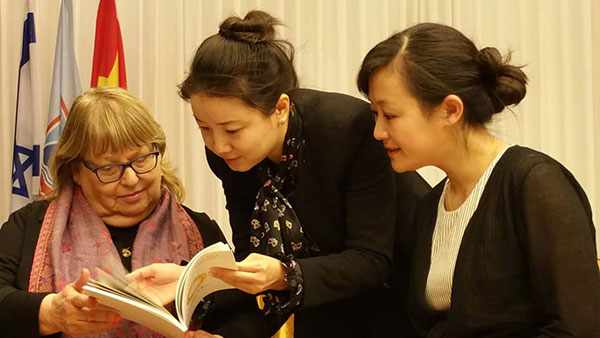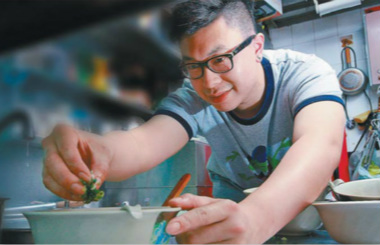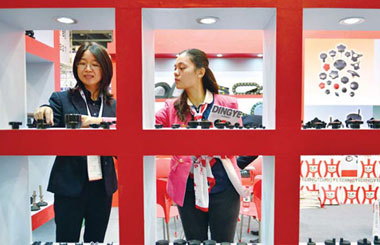For Chengdu and its sisters, sharing works
Updated: 2016-01-29 09:30
By HUANG ZHILING(China Daily)
|
|||||||||||
 |
|
Hedva Almog (left), deputy mayor of Haifa, examines Chengdu's brochures on the two cities' cooperation programs.[ZENG YI/CHINA DAILY] |
Chengdu, capital of Southwest China's Sichuan province, embraced a single sister in 1981, but in the years that followed, it sprouted a large clan, adding 28 more. Its sister city relationships now include Haifa, Israel, a center of scientific research, and Horsens, Denmark.
All three place a premium on education, and that's been the basis of a happy family.
Lin Jingting, who is studying for a master's degree in molecular biology at the University of Haifa, said she is delighted by the increasing exchanges between Chendgu and Haifa, which forged ties in 2013. Each month brings new visitors from China.
Lin, 23, a native of Yibin, Sichuan, majored in food quality and safety at Chengdu University, and it made a difference to her in Israel.
"When I cook in my dormitory, the Israeli students show a keen interest in Sichuan food, and they wanted to visit Chengdu after I told them more about the city," she said.
At Haifa's City Hall, Hedva Almog, the deputy mayor, noted Haifa's close cooperation with Chengdu in education, including a high school that forged ties with a counterpart in Chengdu.
Also proceeding smoothly is the student exchange program between the University of Haifa and Chengdu University, Almog said.
"Thanks to the program, 10 Chengdu students are studying at the University of Haifa, and two or three students from the University of Haifa go to Chengdu each year," said Hanan Alexander, dean of students and head of the university's International School. "Exchanges of teachers for academic purposes and cooperation in training teachers are on the agenda on both sides, and a Confucius Institute will be built at the University of Haifa in the near future."
A delegation from Chengdu also made a trip to Kaskelotten, a kindergarten in Horsens, Denmark, where the visitors observed 16 toddlers learning to pronounce letters in Danish by singing along with their three teachers.
Danish kindergartens stress teaching through lively activities, said Anni Jacobsen, the kindergarten's manager.
The Danish concept of preschool educational concepts will soon be introduced to Chengdu, which forged sister city ties with Horsens in 2013. The Chengdu Horsens Kindergarten and Chengdu Horsens Primary School are expected to open in September.
Differing from traditional Chinese kindergartens and schools with large activity spaces, the new buildings will have many small activity spaces. The design reflects the Danish educational focus on individuality.
The quality of Danish education for service providers for the elderly is recognized globally. VIA University College in Horsens has cooperated with Chengdu in the field.
Rikke Hjuler Mikkelsen, who is in charge of the international program at the college, said the Danish encourage the elderly to live at home as long as possible. Only when they cannot take care of themselves will they move to care facilities.
That is similar to the concept of home-based care being promoted in Chengdu.
During Denmark Week in Chengdu in September, Peter Soerensen, mayor of Horsens, said Danish nursing homes are like families, with service providers helping residents feel at home. It is common for the residents to organize travel, eating and reading clubs in each other's homes, he said.
Related Stories
Chinese music takes its place on global stage of cultural exchange 2015-12-28 08:20
People-to-people exchange facilitates building of digital silk road 2015-12-16 18:29
Top 10 highlights in China-UK Year of Cultural Exchange 2015-10-20 10:46
Cultural exchange life blood of Sino-US relations 2015-09-30 00:59
Musical exchange hits high note on FM broadcast 2015-09-28 13:24
Today's Top News
Record number of Chinese tourists visited UK in 2015
Foreigners fill in Spring Festival courier gap
UK adventurer dies on solo journey
Families of expats in China can stay longer
China's growth envy of developed world
Foreigners find hard to buy China's rail tickets
Rags to riches saga underlines China's transformation
Leaders address Iran's thirst for growth
Hot Topics
Lunar probe , China growth forecasts, Emission rules get tougher, China seen through 'colored lens', International board,
Editor's Picks

|

|

|

|

|

|






